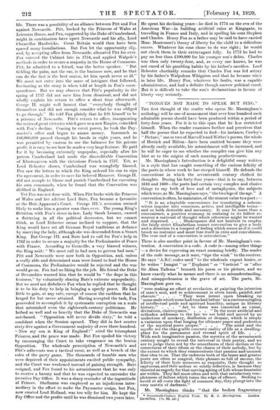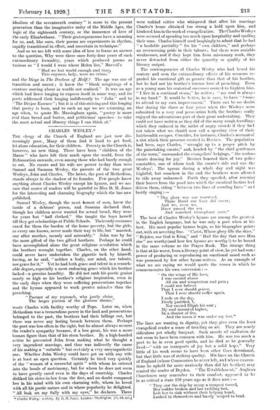" TONGUES NOT MADE TO SPEAK BUT SING."
ME first thought of the reader who opens Mr. Massingham's anthology will be one of amazement that over four hundred such admirable poems should have been produced within a period of forty-four years. For it is to this span that he has restricted himself. When the reader examines further and perceives that half the poems that he expected to find—for instance, Cowley's " Picture," one or two of Marvell's and Wither's poems, the whole of Herrick and Milton—have been omitted because they were already easily available, his astonishment will be increased, and he will be eager to see whether the compiler can give him any hint as to the (nights of such amazing productiveness.
Mr. Massingham's Introduction is a delightful essay written in a style that has caught something of the curious felicity of the poets in whose work he has steeped himself. He defends the conventions in which the seventeenth century clothed its thoughts. During his forty-four years—that is to say, between 1616 and 1660—the poets had certain very complex and elusive things to say both of love and of metaphysics, the subjects which were, as Mr. Massingham says, " the two legs of the age." A convention is often, he maintains, of the utmost value to a poet :- " It is an adaptable convenience for translating a subcon- scious impulse into conscious, active, and intelligible terms— and so both desirable and necessary. It may be more than a convenience, a positive economy in realizing to its fullest re- sources a material of thought which otherwise might be wasted and dispersed. . . . Shakespeare did not hesitate to employ the fairly strict Elizabethan sonnet convention to give a body and a direction to a tempest of feeling which seems as if it could brook no restraint and must lose itself in cries and convulsions. The true end of a convention is articulation."
There is also another point in favour of Mr. Massingham's con- tention. A convention is a code. A code is—among other things —a device for expressing an exact meaning briefly. The sender of the code message, as it were, " tips the wink " to the receiver. He says "A.B.C. codes used" to the wholesale export hosier, or he writes Imagist " or " Euphuist " or Vortieist " or after Sir Alma Tadema " beneath his poem or his picture, and we know exactly what he means and there is no misunderstanding. And misapprehension is the grave of art.. The poets, Mr. Massingham goes on,
" were making an effort at revelation, at painting the intention of man's soul, and so achievement is often harsh, painful, and obscure." . . . " They were intent upon breaking up ' some seals which none had touched before ' in a curious mingling of intellectual pride and spiritual humility, unique in literary history." . . . " Art to them was conceived as vision, divination, clairvoyance." . . . " In the most artificial and orthodox addresses to the fair we are held and moved by an undertone of mockery, disillusion or despair, which is simply a variation upon that longing for ultimate peace and perfection of the mystical poets proper." . . . " The artist. and the mystic see the char g3able concrete reality of life as a dwelling- place for the permanent and eternal spirit of life. . . . With such imaginative passion, the mystics of the seventeenth century sought to reveal the universal in their poetry, and we are to judge them not by the smoothness of their diction or the correctness of their idiom or the charm of their melody, but by the extent to which they communicate that passion and unmask that idea to us. That the cadences both of the lesser and greater poets are often so magical, their phrases so full of savour, the felicity of their lyric measures so exquisite, their thought so rapturous, and their ardour so subtly reflective, is because thty thirsted so eagerly for that moving spring of Life whose fountains are within. They fail more often and with that satisfactory com- pleteness of failure which turns the edge of offence. Seeking to avoid at all coats the light of common day, they plunge into the very matrix of darkness."
Mr. Massingham thinks " that the broken fragmentary
• Seventeenth-Century English Verse. By H. J. Xassingluou. London Ifacm[flan. [So. Od. net
idealism of the seventeenth century " is more to the present generation than the imaginative unity of the Middle Ages, the logic of the eighteenth century, or the innocence of love of the early Elizabethans. " Their grotesquenesses have a meaning for us, and, like ours, their poems are experiments in rhythm, rapidly transitional in effort, and uncertain in technique."
And so we are left with some idea of how to frame an answer to the question, Why were there once forty-four years of such extraordinary fecundity, years which produced poems as various as I would I were where Helen lies," Marvell's " Had we but world enough and time, This coyness, lady, were no crime," and the Dirge in The Duchess of lifolfi ? The age was one of transition and unrest ; it knew the " blank misgivings of a creature moving about in worlds not realized." It was an age which had fierce longing to express itself in some way, and its poets addressed their longing indifferently to " Julia " and to "The Divine Essence" ; but it is of this striving and this longing that poetry is born, and to such an age we are returning, an age when, to quote Mr. Massingham again, " poetry is more real than bread and butter, and politicians' speeches—to take the most actual and illusory things I can think of."



































 Previous page
Previous page